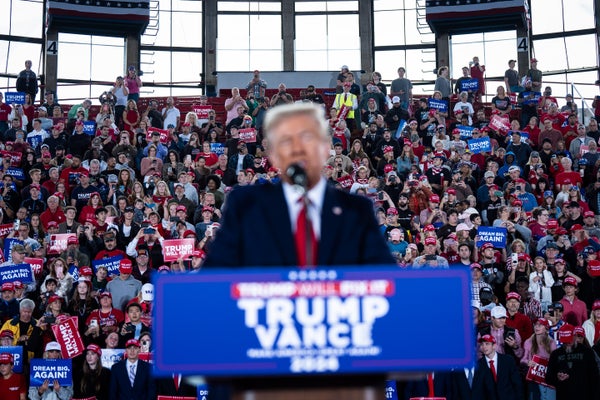
Why Gen Z Men Voted for Trump
www.scientificamerican.com
OpinionDecember 4, 20246 min readWhy Gen Z Men Voted for TrumpGen Z cant stand inequality. Why so many of its men voted Republican is a lesson in understanding male identityBy Adam StanalandSupporters listen to former president Donald Trump at a campaign rally in Raleigh, N.C., just before election day. Jabin Botsford/The Washington Post via Getty ImagesA few years ago I was hired to help revise a psychology textbook to make it more engaging for Gen Z. Im a millennial, but my younger brother is Gen Z (digital natives born between 1997 and 2012), and our perceptions of American life differsometimes significantly.To help with my revisions, I read iGen by psychologist Jean Twenge. The books central hypothesis is that Gen Z is uniquely and acutely concerned with tolerance, diversity and social justice, more so than any American generation before.But as with every generation, there are outliers. And these outliers can surprise us and teach us what makes the subgroups of a generation tick.On supporting science journalismIf you're enjoying this article, consider supporting our award-winning journalism by subscribing. By purchasing a subscription you are helping to ensure the future of impactful stories about the discoveries and ideas shaping our world today.As a social psychologist who studies the interplay between societal structures and individual psychology, I have seen that relationship come into focus during this presidential election. Ive followed exit polls closely, watching for psychological surprises in policy trendsplaces where behavioral expectations for individuals and groups (based on their psychology, history and sociodemographic orientations) diverge from what actually unfolds. What Ive seen in the voting trends of Gen Z is something politicos need to pay attention to as the next generation reaches voting age: the young white male vote is skewing conservative, in part because of how society defines and sets expectations around masculinity.Gen Z, as a bloc, should have voted blue. Democrats, after all, claim to be the party of progress, especially when compared with the present iteration of the Republican Party, and Twenge argues that Gen Z individuals are obsessed with safety, focused on tolerance, and have no patience for inequality. Kamala Harris centered herself on a key progressive issuesalvaging womens right to abortionwhereas Donald Trump campaign was full of sexist remarks and a promise to roll back protections for transgender students in schools. And while Democratic VP candidate Tim Walz was hailed as a progressive champion, Trumps running mate J.D. Vance espoused regressive and demeaning views about womens place in American society. All in all, if its true that Gen Zers are defined by their progressive views on sociopolitical issues, they should have voted overwhelmingly for the Democratic ticket. The Harris-Walz campaign was certainly counting on it.And they did, sort of. Fifty-four percent of Americans ages 18 to 29 voted for Harris and Walz. This is nothing new: Young people skew blue. Yet, if what Twenge and others say is true, and this group is uniquely concerned with social justice, this number should have been higher. I was certain that Gen Zersregardless of their gender, educational attainment or geographic locationwould overwhelmingly vote for Harris. But they didnt. Democrats lost a lot of footing with young voters, despite nearly every historically marginalized group, especially LGBTQ+ youth, leaning left.Who, then, didnt vote as expected? Young Gen Z white menmainly those without college degreesvoted overwhelminglymore likely to vote blue (43 percent) than their just-older millennial peers (34 percent).As a researcher who studies identity, behavior and aggression among young men, these patterns set off alarm bells for me.But, the answer isnt as simple as toxic masculinity. What really led white, working class Gen Z men to align themselves with Trumpa candidate characterized by his anger, aggression, hatefulness, hegemony and specific brand of manhood? Based on research spanning decades, including my own, the answer relates to three core ideas of social psychology: conformity, motivation, and threat.Conformity is a basic tenet of the human experience. Whether we realize it, everyone conforms to norms nearly every moment of every day. We dress appropriately for work, we stifle opinions that might upset group harmony, and we (hopefully) stand to the right on escalators for passersby. In the context of gender, the large majority of us conform to the norms associated with our gender group, especially men and boys, who are more often penalized for gender norm deviation than women and girls.The disproportionate pressure men and boys experience to be stereotypically masculine brings me to the central role of motivation in male anger and aggression. In self-determination theory, pressure is the antithesis of autonomy. Humans need to feel as though we have agency over our actions, which is why pressured motivation is linked with a host of negative outcomes. For example, when learning is framed as something intrinsically enjoyable, we tend to be more deeply engaged, compared to when its framed as pressured (e.g., to get good grades).Peoples motivations for gender conformity can also be pressured or autonomous. My fellow researchers and I found that younger men pressured by the expectations of others exhibited the highest levels of aggressive, angerlike response when feeling as though they needed to assert their manhood. We attributed this to the fact that, compared with older men, younger men are in the throes of their masculine identity explorationa time when pressures are exacerbated in relationships, careers and families. This is why masculinity may be especially fragile during this life stage.Our findings dovetail with Gen Z working class mens voting behavior in the recent presidential election. These young men are faced with constant pressures in an increasingly uncertain America. On the one hand, young men from rural conservative areas experience pressures of past generations: to excel financially so that they can find and support a nuclear family. On the other, they experience new pressures and sources of uncertainty (read: threat). With the ever-shrinking of the middle class, Gen Z men (including Black and Latino men) voted for Trump as a response to an economy that is excluding them, with one in five young men presently jobless. Trump also stoked the flames of xenophobia, encouraging his base to blame immigrants for their own economic hardship, even if these accusations are entirely unfounded. In a culture that equates being a man with financial success, supporting ones family, and achieving the American dream, the election results are now no surprise to me. Young, working class mens electoral anger was a directand very humanresponse to sustained pressures, perceived threats, and general fears for themselves and their families.At the core of all of this, I believe, is the antiquated misperception that men must be powerful, bread-winning protectors in their families and broader society. This notion is called hegemonic masculinity, and endorsement of this belief set was the strongest predictor of support for Trump in 2016 and 2020, even stronger than voters political party affiliation, gender, race or education. In a recent study, we tested when and why boys ages 10 to 14 in the U.S. begin exhibiting the same patterns that lead to aggression among young adult men. We found that a combination of masculinity threat and pressure predicted boys aggressive respondingi.e., how aggressively they felt and were thinkingin mid-late puberty but not before, which helps us understand when masculine fragility arises (knowing that it subsides later in life). We also collected data from boys parents. We found that masculinity pressures were especially high among boys whose parents endorsed hegemonic masculinity. In turn, we found that these parents were especially likely to be working class and reside in more conservative U.S. counties.In other words, we identified the subset of parents who place the most pressure on their sons to be powerful, breadwinning protectorspressure that, in turn, predicted how aggressive boys became to defend their manhood. Our findings suggests that if things proceed as usual in American societycombining pressures to fulfill antiquated gender expectations with real socio-economic threatsnone of us should be surprised when working class Gen Alpha men vote just like their Gen Z, millennial and elder counterparts.Short-term solutions are hard. In past work, Ive proposed solutions to mens compensatory anger and aggression at both the individual and societal levels. For example, I believe that its important for adults, such as parents, clinicians and teachers, to resist the urge to put undue pressures on boys, as well as to equip boys with the tools they need to resist such pressure. At a broader level, its important to promote gender diversity in positions of leadership and power, so that boys learn that people of all gendersnot just menshare the responsibility for providing and protecting. If we can target the mechanisms underlying the pressure that boys and men experience, we should be able to mitigate the anger and aggression they exhibit to prove their manhood.In the even shorter term, we must consider perspectives different from our own. Young working class mens anger in this election cycle was a direct and human response to basic psychological pressure-threat processes. Until Democrats at least begin to consider (and not ignore or eschew) these perspectivesthe unique pressures and perceived threats faced by working class Americanswe should brace ourselves for many more surprises like this to come.This is an opinion and analysis article, and the views expressed by the author or authors are not necessarily those of Scientific American.
0 Commentarios
·0 Acciones
·78 Views











